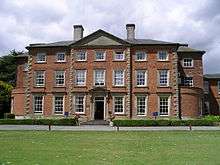Ansty, Warwickshire
Ansty is a village and civil parish in the Rugby Borough of Warwickshire, England, about 5 miles (8 km) northeast of Coventry city centre and 8 miles (13 km) south of Hinckley. Ansty was part of the County of the City of Coventry until that county was dissolved in 1842. Ansty is on the B4065, which used to be the main road between Coventry and Hinckley. The junction between the M6 and M69 motorways and A46 road is 1 mile (1.6 km) southwest of the village.
| Ansty | |
|---|---|
 The main road through Ansty | |
 Ansty Location within Warwickshire | |
| Population | 324 (2011 Census[1]) |
| OS grid reference | SP397833 |
| Civil parish |
|
| District |
|
| Shire county | |
| Region | |
| Country | England |
| Sovereign state | United Kingdom |
| Post town | Coventry |
| Postcode district | CV7 |
| Dialling code | 024 |
| Police | Warwickshire |
| Fire | Warwickshire |
| Ambulance | West Midlands |
| UK Parliament | |
| Website | Ansty Parish Council |
The Northern part of the Oxford Canal, once a major coal-carrying system and now a popular leisure resource, passes through the village. Ansty has been cited as "the most boater-hostile village on the canals" because of the huge number of "no mooring" signs.[2]
History
The Domesday Book of 1086 mentions Ansty as part of the hundred of Brinklow.[3] The main landowner was Lady Godiva.[3] Its toponym comes from Old English Ānstīg meaning "one-path", i.e. "lonely or narrow path" or "path linking other paths".
The Church of England parish church of Saint James has a 13th-century chancel.[4] The arcade between the nave and north aisle is 14th century.[4] Sir George Gilbert Scott rebuilt the rest of the church in 1856.[4]
Ansty Hall, just outside the village, was built in 1678[4] for Richard Taylor, who had been on the Parliamentarian side in the English Civil War. The house is arranged in seven bays and built of brick with stone quoins and pediment.[4] It is now the Ansty Hall Hotel.[5]
A cottage industry of weaving developed in the parish from early in the 18th century.[3] This grew into a substantial ribbon-making trade early in the 19th century, but declined in the 1830s.[3]
James Brindley completed the section of the Oxford Canal through Ansty in 1771.[6] In November 1963 a 30 feet (9.1 m) high embankment on the towpath side gave way, spilling 10,000 tons of sand and clay onto adjoining land.[7]
In the 1940s, 1950s and 1960s, Armstrong Siddeley Motors had its development plant for gas turbines and aircraft rocket motors as well as the Gamma rocket motors used in the Black Knight and Black Arrow launchers.[8] The plant is now the Ansty engineering works of Rolls-Royce. In 2013, Rolls-Royce announced the closure of the military part of the plant.[9] The civil part of the plant remains unaffected.
In 2012, Ansty erected its first War Memorial, a black obelisk, after the hard work of local villagers headed by Chief Petty Officer Dean Bateman.[10]
Amenities
Ansty has a pub, the Rose and Castle Inn, beside the canal. There is also an Ansty Social Club and an Ansty Golf Club.
Gallery
 St James' Parish Church
St James' Parish Church Road bridge over the Oxford Canal
Road bridge over the Oxford Canal Ansty Hall
Ansty Hall
References
- "Civil Parish population 2011". Neighbourhood Statistics. Office for National Statistics. Archived from the original on 23 December 2015. Retrieved 22 December 2015.
- https://canalplan.eu/place/mv55
- Stephens, 1969, pages 98-103
- Pevsner & Wedgwood, 1966, page 67
- Macdonald Ansty Hall Hotel
- Compton, 1976, page 19
- Compton, 1976, page 152
- Flight magazine, July 1956
- "Rolls-Royce Ansty to lose 378 defence jobs". BBC News Online. 22 January 2013.
- "Sailor's £20,000 mission to create Ansty war memorial". Coventry Telegraph. Retrieved 11 April 2012.
Sources
- Allen, Geoff (2000). Warwickshire Towns & Villages. ISBN 1-85058-642-X.
- Compton, Hugh J (1976). The Oxford Canal. Newton Abbot: David & Charles. ISBN 0-7153-7238-6.
- Pevsner, Nikolaus; Wedgwood, Alexandra (1966). The Buildings of England: Warwickshire. Harmondsworth: Penguin Books. p. 67.
- Stephens, W.B. (1969). Victoria County History: A History of the County of Warwick, Volume 8: The City of Coventry and Borough of Warwick. pp. 98–103.
- "Scorpion and Screamer" (PDF). Flight: 76. 13 July 1956.
External links
| Wikimedia Commons has media related to Ansty, Warwickshire. |
- Ansty in the Domesday Book